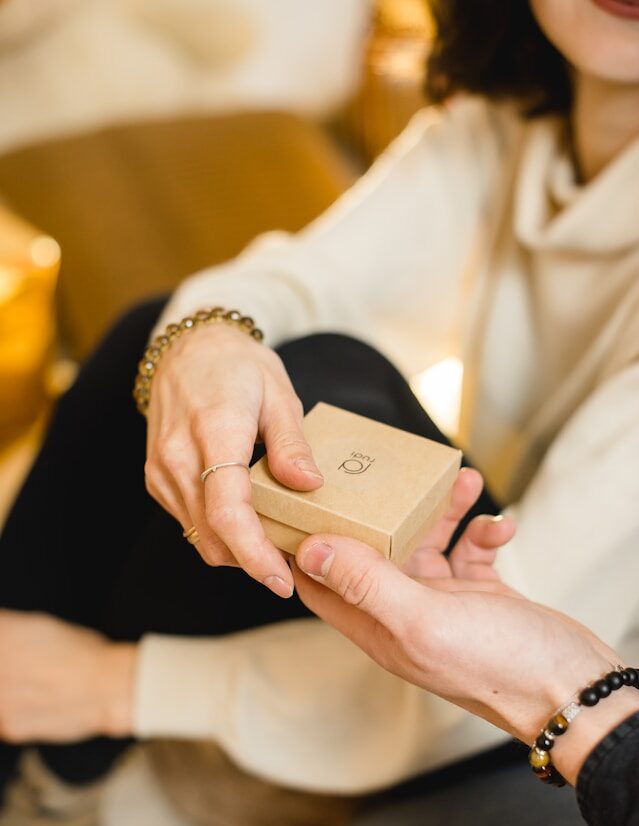Good Gifts
Good gifts come without strings attached. By strings, I do not mean ribbon or twine but the unseen binding that frequently entangles the Giver and Gift-ee. Often unconscious, this particular tie has the power to turn what appears to be a pleasing thing into quite the opposite, such as a bribe, an obligation to reciprocate, or a negative message. A gift can become a competitive gesture and even a warning of where a relationship is headed.
One Christmas night, my new college boyfriend appeared unannounced at my family’s front door. Though thrilled to see him, I realized I had no present to give him. Panicked, I asked my brothers on the QT if any of them had received a gift they’d be willing to part with so I could rewrap it for him. One brother handed over a new board game he didn’t want. Though I knew for a fact that my BF detested board games, still, I chose to wrap it up rather than face him empty handed.
For I was pretty sure he had a gift for me.
And he did.
A small porcelain sculpture of a fish. A knick-knack. It was a castoff gift that originally had been given to one of his sisters that Christmas morning. I detest knick-knacks.
A coincidence, yes. A mutual disappointment, too. We were crazy about each other but our relationship was only months old. We did not know each other well. We failed to grasp that simply being together on Christmas was the gift. Magical. Hence, the items we exchanged fell short because they were insincere.
When it comes to gifts, etiquette experts agree: the more intimate the relationship, the bigger the chance for success or disappointment. Bad gifts may indicate that the relationship is already in trouble. He and I eventually parted ways.
Whereas, good gifts move the relationship forward to deeper trust and greater pleasure. I believe that good gifts have no agenda. They are freely given from the heart. Is it the thought that counts? Much preparation has gone into many an inappropriate gift. The so-called gag gift is a prime example. The emphasis is on “gag” not “gift” and it can backfire.
I once attended a farewell dinner for a beloved and famous head of psychiatry at a of teaching hospital. The event took place in a fancy hotel and the crowd assembled was keyed up with excitement. Rumor had it, the psychiatric residents were going to give their professor a special gift. The speeches culminated with the announcement that a new “Chair” appointment to the faculty had been set up in his name, a rare and well-deserved honor. With that, several residents carried their gift, cumbersome and covered in burlap, up to the stage and set it down before him. When at last they unveiled the item, it turned out to be a gleaming white porcelain toilet—their gag gift on this auspicious occasion.
While we guest recoiled in dismay, the honoree modestly stepped up to the microphone. He did not react with anger but compassion, gently reminding them that love and gratitude are best expressed with sincerity and taught his students and all present one final lesson.
Are you familiar with O. Henry’s classic tale, ‘The Gift of the Magi’? It’s often cited as the gold standard of altruistic gift-giving between lovers. It’s a short read. A couple of economically distressed newlyweds put so much care into their Christmas gifts that they each sacrifice their dearest possession in order to please the other. And though the outcome makes us wince, we readers can imagine how favorably it will affect the relationship for the entirety of the marriage.
We may not be able or be inclined to sacrifice as much as Della and Jim each time we give a gift, but we can emulate their motivation if we make the effort. It’s the message of I care that transforms an item into a gift. Care involves thought, observation, and more. Care involves putting aside your agenda, your desires, your preferences and placing the emphasis on the recipient. Money is not an indicator of motive, just a means and not always a necessary one! So, how can you make your gift romantic?
Gifts are linked to fantasies of who we want to be. We all want to be passionately loved. The smart man says with his gift: ‘I want to win your heart now and always.’ The smitten woman, like young Mary Hatch in the film It’s a Wonderful Life, says with her gift: ‘George Bailey, I’ll love you till the day I die.’

Sheila M. Cronin is the award-winning author of The Gift Counselor, endorsed by Publishers Weekly Indie Spotlight as “goodwill for adults.” Best of All Gifts is the sequel. Her stories have appeared in Woman’s World Magazine, Good Old Days Magazine, Spark, witcraft, Kaleidoscope, The Lutheran Digest, and more. Cronin’s collection of short stories is entitled Heart Shaped II. Please visit www.giftcounselorbook.com for more information.



